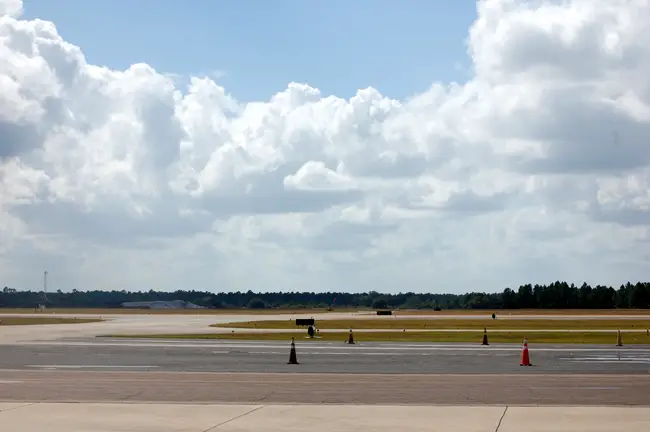
Palm Coast and Flagler County are in a new battle over annexation, with a planned National Guard reserve center caught in the middle. A point of contention: whether Palm Coast has the right to annex the land where the reserve center will be located, if the center is to tap into city water and sewer services. The city says it does, by policy. The county says it doesn’t, because a court settlement on that very issue supersedes Palm Coast policy.
“If there’s an agreement, I’d like to know what the agreement says, and an agreement is an agreement,” Palm Coast City Council Frank Meeker said late last month, during a city council meeting County Commissioner Milissa Holland was attending—and walked out from when City Manager Jim Landon characterized the National Guard deal as more of a city than a county initiative. “We’ll pull that agreement and determine if the airport was addressed,” Landon said at the time.
Click On:
- Al Hadeed’s Memo to the Commission
- The Service Agreement Maps
- The Relevant Parts of the 2007 Settlement Agreement
- Holland Walks Out on Palm Coast Council As It “Rewrites History” Over Annexation
- Bold and Bolder: County Commission Bashes Landon and Coffey Over Annexation Proposal
- Classic Landon: County on Notice that Palm Coast Will Annex Airport. County Begs to Differ.
- Water Wars Redux: Homeowners Sue Palm Coast Over Annexation Bullying
County Attorney Al Hadeed pulled the agreement and told the county commission on Thursday, in words leaving little to no shades of gray, that the county is clearly within its rights to keep the property and draw Palm Coast water and sewer, while Palm Coast has no grounds, legally or literally, to annex.
The 2007 settlement agreement was the result of a long dispute—dubbed the “water wars” between the city, the county and Flagler Beach over similar issues. Palm Coast was aggressively annexing or, in the case of the Hammock, using strong-arm tactics such as making water and sewer service conditional on annexation—something it claims it can legally do under Florida law, but isn’t required to do.
Palm Coast’s tactics frayed relations between governments and damaged cohesion across communities until the 2007 agreement cooled tempers and restored saner relations.
The agreement is readily and electronically available in court files—and could have been pulled up on any laptop during the city council meeting last month. It was used to buttress a fresh court case in mid-August when Palm Coast Plantation, the gated community off of Colbert Lane, sued Palm Coast over the city’s attempt, in a Hammock-like repeat, to compel the community to annex into the city in exchange for water service.
The agreement reads: “Palm Coast agrees that it will not require annexation as a condition of providing retail water and wastewater service in those areas depicted on the map that are currently in the Palm Coast’s Chapter 180 Florida Statutes, Service Area, south and/or east of the existing Palm Coast city limits, and lands east of the Intracoastal Waterway and the provisions of this agreement shall prevail over Palm Coast’s policy relating to mandatory annexation as part of the provision of utility services I those areas.”
The black and white maps included with the agreement in electronic form, however, were virtually unreadable. Hadeed pulled the original color codded maps from the court file, which clearly delineate the service agreement’s boundaries.
“The Airport and the adjoining properties, including the Florida National Guard area, are clearly within the chapter 180 service area,” Hadeed wrote in a memo to the county commission. “I have confirmed that determination with both the planning department and the engineering department.” Hadeed also produced an oversized Chapter 180 service map commissioned by Florida Water Services, which provided water and sewer to Palm Coast and surrounding areas before the city bought the utility, which “confirms in much larger scale the conclusion made by the two departments, as well as my own conclusion from studying these maps,” Hadeed wrote.
“Accordingly, the Florida Army National Guard area is not subject to annexation by the City of Palm Coast irrespective of what the City of Palm Coast policy may state today or in the future.”
The issue is relevant on two grounds. First, the National Guard has been uneasy over being put in the middle of a political battle, and the matter had the potential either to delay construction or lead the National Guard to second-guess its decision. (The point may be moot if the new Congress decides not to fund the reserve center’s construction. That appropriation is still pending, and would have to be approved as one of those dreaded “earmarks” that U.S. Rep. John Mica decries but makes use of at the same time. Many newly elected Republicans want a freeze on earmarks.)
Second, the battle over the national guard site is emblematic of city-county relations that have been fraying again as Palm Coast asserts its authority where the county sees overreach. Neither the city council nor the county commission have been interested in renewing anything like the “water wars” they struggled through last decade. Yet both elected panels are finding themselves in more antagonistic stances than they expected, chiefly as a result of administrative negotiations—or, in the case of the 2007 agreement and maps, lack of preparation on Palm Coast’s side—that outran the elected boards’ positions.
If, to borrow Meeker’s phrase, “an agreement is an agreement,” the evidence may have resolved the dispute.





























New media needs to be held accountable says
“NO Bull, NO Fluff, NO Smudge” !!!! ????? REALLY!
. says
i just hope that PC did not blow this for the County as a whole by all its BS on this.